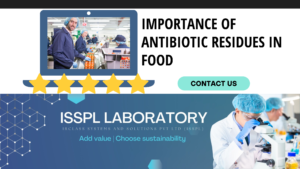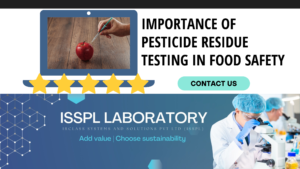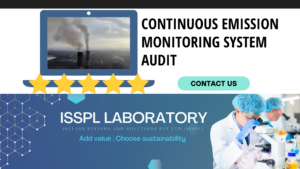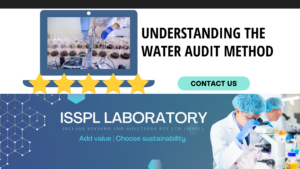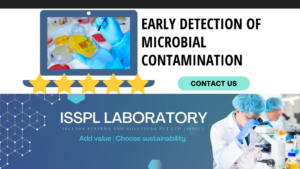An Overview by Team ISSPL - Analytical Testing Laboratory in India
ToggleWater is among the vital resources on the planet. Water constitutes the foundation of life and helps regulate human and environmental health. With the growing pollution rate and industrial practices, water sources have become contaminated. One can witness a variety of pollutants, like – chemicals, bacteria, viruses, and toxic substances. All these have made the process of water testing essential.
The growing significance of water testing
Water testing is the procedure of reviewing and assessing a sample of water. It is vital to determine water quality. The test reports help identify the potential contaminants. The analysis and reports exhibit critical information, including – pathogens and their levels, nutrients or pollutants in the water, and the overall sample health.
- For health – Different reasons make water testing integral. The process helps protect human health. Waterborne diseases can lead to illness or cause death. Contaminated drinking water is a prime source of these life-threatening diseases. The modern solutions for water testing review the samples for harmful pathogens, including E. coli and coliform bacteria. The water treatment facilities review the sample and ensure that the drinking water is safe for human consumption.
- For industries – Water testing is a vital component of industrial and agricultural operations. Most industries rely on water as a prime resource. With the sample testing, one can ensure that the water in use is of supreme quality and does not contain harmful contaminants. Conventional and perioding water testing at the industrial outlets can help identify the potential issues. With the assessment reports, industrialists take steps to address the issues beforehand. Prevention gets convenient with such proactive steps.
- For compliance – Finally, water testing is paramount for regulatory compliance. There are diverse industrial and global norms and regulations to govern water quality. All industries, companies, and municipalities must adhere to the critical water standards and avoid the chances of paying hefty fines and legal penalties. The only solution is to conduct regular water testing at the supply points.
Quality testing of drinking water
Water quality assessment involves various procedures. The assessment is used to analyze water quality at various stages. Different parameters are critical in the process, and one must consider them for testing the quality of water. Drinking water requires an extensive assessment process to ensure that water is safe for usage and consumption.
Water testing is an expansive process. It is not limited to the exclusive steps of testing drinking water. It is critical to check the domestic wastewater, industrial effluents, packaged and natural mineral water, groundwater, etc. Simply put, all samples are vital. 2/3rd of the human body constitutes water, and thus, it is essential to secure drinking water safety. More than 3 million people die due to drinking water contamination. Diarrhea is a prime reason behind the death, and the number increases every year because of water pollution. It is paramount to ensure that the drinking water is pure and contains no toxic bacteria and harmful metals. Drinking water analysis at world-class laboratories is the ideal solution to meet the testing requirements.
Sample testing and location checks
Drinking water sampling is the most common form of water analysis. The sample must be taken from the prime location. Among the various techniques, the process of microbiological quality checks has become paramount. It is a process to indicate the presence of bacteria, turbidity, and free chlorine and determine the pH level. Drinking water analysis must carried out at least once a year. The samples require extensive care and protection to ensure the accuracy of the testing report.
Standards of drinking water testing
Water quality testing helps understand the various attributes of drinking water. It reviews the suitability of the water to use for multiple purposes. The prime standards for water testing get governed by APHA, IS, CPCB, and WHO. The quality norms vary with the purpose and utility of the water.
Testing types you must note –
- Physical Tests For Water Quality – The physical tests indicate properties detectable by senses. It includes the water color, turbidity, odor, and taste. All these parameters are critical to review in the physical tests.
- Chemical Tests for Water Quality – The chemical assessment helps determine the amount of mineral and organic substances that may impact the water quality. pH, BOD, DO, Ca, Mg, and Cl are the prime parameters grouped under chemical tests.
- Bacteriological Tests for Water Quality – These specify the presence of bacteria in the water sample. Bacteriological tests are the indicators of fecal contamination.
Chemical testing for drinking water
- The test reports of physio-chemical analysis make a significant impact. However, it is insignificant if the sample is not properly collected or stored. The time taken between sampling and analysis must be minimal. Storage is also integral. One must use a glass or polyethylene bottle and maintain a low temperature at optimal light conditions. pH, turbidity, and residual chlorine require instant checking to avoid the mismanagement of storage and sample transportation.
- Apart from water testing, the disinfection of drinking water helps create an effective barrier against various types of waterborne diseases. One can apply various types of disinfectants, but chlorine is still the principal disinfecting agent. Different types of chlorine make significant differences in the testing results – free chlorine (The most reactive component, i.e., hypochlorous acid and the hypochlorite ion), combined chlorine (It is less reactive but more persistent), and total chlorine.
- Portable pH electrodes and meters are used in the laboratory for water testing. The lab specialists use the portable electrodes and calibrate them against fresh pH standards for field use. The lab facilities play an integral part in determining the accuracy of the reports.
Recognize the prime parameters with lab testing.
Water is an integral natural resource, and it is essential for various commercial purposes. Drinking water quality standards define the prime parameters that make the water safe enough for human consumption. Rely on the lab offerings to check the water quality and obtain accurate results with the world-class testing facilities at IRCLASS Systems and Solutions Pvt Ltd (ISSPL) laboratory.

